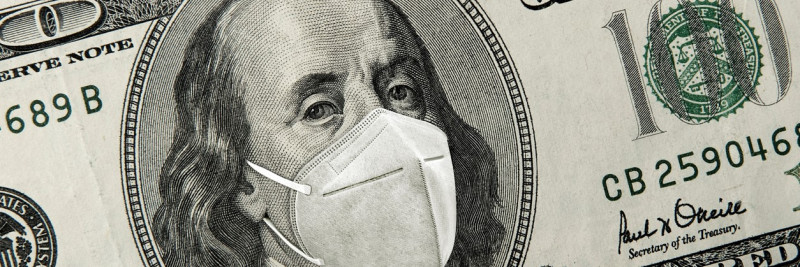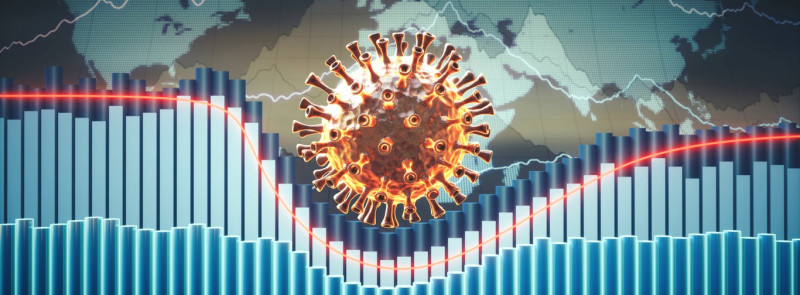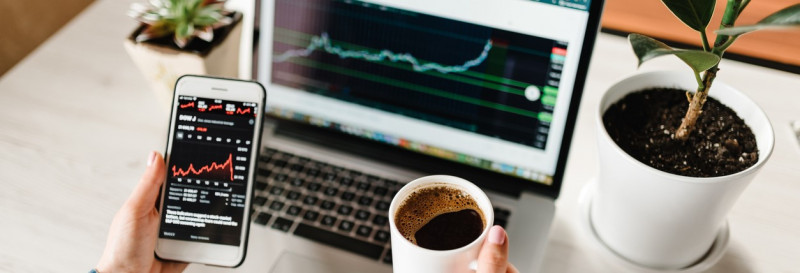10 FAQS About Our Current Economy
By
ASB March 26, 2021 | 5 min read OtherThe COVID-19 pandemic has made many unforeseen impacts on the United States economy, from nationwide unemployment to the affects it has had on travel and tourism. Everyone from news reporters and politicians to business owners and family members seem to be talking about the current economy.
At American Savings Bank, we want to remind you that you’re not alone if you’re feeling confused or overwhelmed by global and national finances. In this post, we share some of the most frequently asked questions we’ve received in recent months.

1. WHAT IS THE ECONOMY?
What do you think of when you hear “the economy”? For many, they picture a room full of arguing politicians or number-crunching economists. The basic definition of the economy includes all of the activities in producing, distributing, and consuming goods or services in a certain area. A good or service is produced and exchanged to a consumer for something of value, such as money.
The United States mostly operates on a market economy, meaning people and businesses are free to exchange their goods or services with one another. For example, you build a birdhouse and sell it to your neighbor. Supply and demand play a large role in a market economy. Let’s say you build a second birdhouse, but now three neighbors want to buy it. You have a lower supply and higher demand, allowing you to charge a higher price. Likewise, you might start producing more birdhouses to meet the new interest in your product.
Although a free market is the main economic system in the U.S., regulations, programs, and restrictions exist. These guidelines are designed to help protect the well-being of everyone in the country. Public schools, for example, are provided by the government to help keep access to education more balanced.

2. HOW IS THE ECONOMY MEASURED?
The most common measurement of the economy is the gross domestic product (GDP). The GDP is the total value of every good and service produced in a community in a year. Economists regularly use GDP growth — how much the GDP has gone up or down over a period of time — to gauge the health of the economy.
A good economy, in general, is one with a growing GDP. This often leads to more businesses, more production, and more jobs. A bad economy, on the other hand, usually means the GDP growth is negative or trending downward from the previous time frame.
The effectiveness of using GDP growth to measure economic health has recently become a debate. Some economists believe the GDP doesn’t provide enough insight into the overall well-being of people within an economy.
3. WHAT IS A RECESSION?
A recession is a financial crisis that occurs due to a steep decline in economic activity. Most recessions lead to higher unemployment, lower production, and a declining GDP. The National Bureau of Economic Research (NBER) is often the authority on declaring a recession in the US.
According to the NBER, a recession occurs when there’s a significant decline in economic activity throughout an economy that lasts more than a few months.
4. WHAT IS A DEPRESSION?
An economic depression is similar to a recession but does more long-term damage: more jobs are lost, there’s a higher unemployment rate, and production slows down significantly. Unlike a recession, economic recovery from a depression is usually much longer. Most depressions last for years instead of months.

5. IS THE STOCK MARKET THE SAME AS THE ECONOMY?
While the stock market and economy are related, they are two different entities.
The economy consists of the production of goods and services in exchange for money. It’s measured by the growth or decline of production and employment. The stock market is a marketplace to buy and sell the ownership of businesses in the form of stocks, mutual funds, and other investment assets.
The economy can be hurting while the stock market surges. The economy includes all businesses — both private and public. The stock market only includes publicly-traded entities. Private businesses, especially small businesses, have been heavily affected by the COVID-19 pandemic. Meanwhile, some large, public corporations are seeing increased demand for products. Since private companies aren’t part of the stock market, financial declines among private companies are not represented in the stock market.
6. WHY DID COVID-19 HURT THE ECONOMY?
The COVID-19 virus has led to a decrease in demand for some products and services. Many communities were put on lockdown for weeks or even months, which resulted in almost no demand for the travel, hospitality and entertainment businesses. Decreased demand also spread through other industries, as fewer people had income for products due to being furloughed or let go from their jobs. Others no longer needed goods or services because they were staying home and only purchasing necessities.
Even with some communities reopening, many businesses are operating at reduced capacity. Many people who lost jobs or had their hours cut have still not fully replaced their income. Public health officials still recommend that people stay home and avoid being in public as much as possible, meaning fewer people are visiting businesses.
These factors have led to lower production, higher unemployment, and less exchange of money in recent months — all indicators of economic health. Since almost every measure of the economy went down, the overall economic well-being decreased as well.

7. HOW IS THE COVID-19 CRISIS DIFFERENT THAN THE 2008 FINANCIAL CRISIS?
The biggest differences between the 2020 economic crisis and the Great Recession of 2008 are the contributing factors and the speed of the economic decline.
In 2008, the financial crisis happened due to the burst of the housing market bubble. Some mortgage lenders had widespread approval of unqualified borrowers, which meant that homebuyers were given a loan they couldn’t afford, resulting in financial imbalance. As a result, the economy steadily declined over several years.
In 2020, the economic downturn was being fueled by the contagious nature of the COVID-19 virus. People have been doing their best to avoid spreading and contracting the virus, which often resulted in more individuals staying at home and putting less money into the economy. The rapid response to slow the spread of the virus led to a quick, almost immediate decline in the economy.
8. IS MY MONEY SAFE AT A BANK DURING A FINANCIAL CRISIS?
A bank is one of the safest places for your money during a financial crisis. Thanks to the Federal Deposit Insurance Corporation (FDIC), bank deposits are insured up to a certain amount. Rather than putting cash under your mattress, consider putting your money into a checking or savings account at a bank where it can stay safe.
9. WHAT’S THE ROLE OF BANKS DURING THE COVID-19 ECONOMIC CRISIS?
Banks are expected to play a central role in the economic recovery of any economic crisis. Due to the pandemic, many banks such as American Savings Bank are offering programs to customers who are out of work and/or facing financial hardships. In addition, banks can help to facilitate federal and state programs such as the Paycheck Protection Program. These programs can give customers the relief they need to find new work, keep their business running or replace decreased income.
For example, by providing options like loan deferment — which allows a borrower to temporarily pause loan payments — banks like ASB are giving customers a chance to get back on their feet.
If you are facing financial hardships due to the pandemic, be sure to explore our hardship programs. Our team is here to help you navigate your options during these difficult times.

10. CAN I DO ANYTHING TO HELP THE ECONOMY?
If you’re fortunate enough to be in a secure financial situation during an economic downturn, spending money in your community can help local businesses and workers. While you can’t single-handedly fix a hurting economy, you can potentially help your most vulnerable neighbors.
Small businesses and lower-wage workers are among the most likely to suffer from an economic downturn, so consider spending money by:
-
Buying from local small businesses, like your corner market or favorite family-owned restaurant
-
Purchasing gift cards from local businesses
-
Donating to local food banks, shelters, and community organizations
-
Tipping delivery drivers, servers, and other service workers generously




